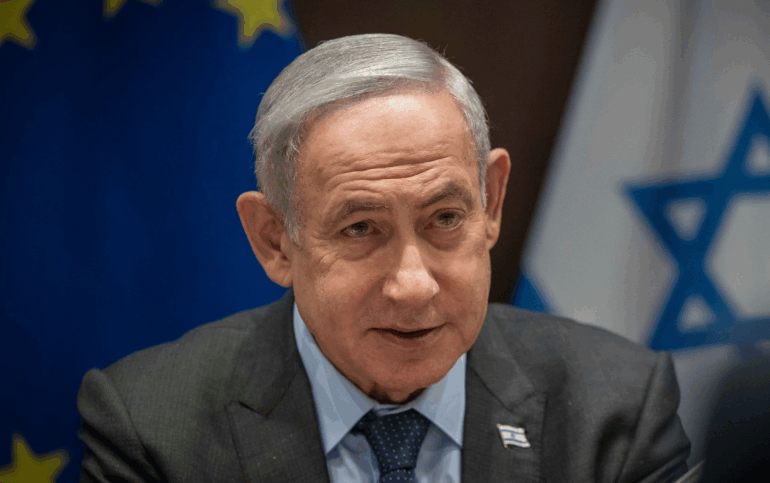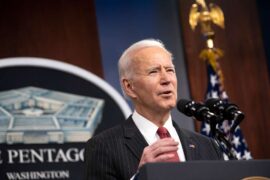Addressing the International Holocaust Remembrance Alliance (IHRA) Conference at Israel’s ministry of foreign affairs last Tuesday, Prime Minister Binyamin Netanyahu (Likud) declared that Israel is currently engaged in a war that is “ultimately, of civilization against barbarism.”
The prime minister emphasized that pro-Palestinian protests in the West not only seek the destruction of Israel but also the destruction of Western civilization.
Netanyahu pointed out that in addition to the burning of Israeli flags, protests in support of Gaza also feature “the burning of American flags, British flags, Canadian flags, French flags.”
“That’s not an accident,” he observed. “Because the people who are leading this charge are basically challenging Western civilization or free societies as we understand them.”
On the One Hand…
Netanyahu has important qualities that often go unappreciated by much of the Israeli public.
He’s the only potential leader that possesses both a clear conception of Jewish national interests and the ability to defend and advance those interests on the geopolitical stage.
Unlike any of his political rivals or potential successors, Netanyahu recognizes the United States and its bipartisan agenda to divide our land as one of the primary threats plaguing Israel. Therefore, despite his age and poor health and the fact that he’s already earned the distinction of being the State of Israel’s longest serving prime minister, he continues to fight to remain in his position.
Netanyahu believes himself to be the only leader capable of both protecting the Jewish homeland from Washington’s two-state agenda and carefully guiding Israel towards military, economic, and political independence. And the fact that every US president that’s had to deal with him (Bill Clinton, Barack Obama, Donald Trump, Joe Biden) has attempted to remove him from office indicates that he’s probably not wrong.
In addition to outmaneuvering successive US administrations, Netanyahu has also facilitated changes in the composition of his government that reflect Israel’s broader sociocultural shifts.
While Israeli institutions have been dominated by “first Israel” (the country’s westernized ruling class) since the state’s establishment, this sector of the population has been shrinking in recent years in favor of a “second Israel” (Ḥaredi, Mizraḥi, national-religious Jews, etc. that all experienced marginalization at the hands of “first Israel”) that is seen by the nation’s elites and presented by the local press as illegitimate partners in running the country.
The fact that Netanyahu has trusted political representatives from these sectors with real power for the first time by giving them important ministries in his coalition is arguably one of the main reasons the Israeli media works so hard to incite the public against him.
The Contradiction
That Prime Minister Netanyahu understands Israel to be a victim of US imperialism, has spend years quietly trying to free Israel from Washington’s control, and has been playing such a key role in facilitating Israel’s transition from a pseudo-Western society to an increasingly Jewish one that in several ways resembles many neighboring states in the region makes Netanyahu’s statement last week all the more puzzling.
As always, Netanyahu makes it difficult for people to guess what he truly believes.
One could make the argument that just as he paid lip service to a “two-state solution” for many years while quietly sabotaging all efforts toward this goal, Netanyahu continues to play a similar game by speaking of Israel as part of the West and of our war against Hamas and its allies as part of a larger clash of civilizations while simultaneously working to free Israel from Washington and transform our society into one that is more at home in the Semitic region.
But the more likely scenario is that the prime minister is himself not fully aware of these contradictions.
Jewish Indigeneity
Despite using the language of “Jewish indigeneity” as an argument to make Israel’s case (a claim we can assume he genuinely believes even if he doesn’t fully grasp its implications), it’s possible that Netanyahu also passively accepts the idea that Israel is part of the West – and that Western civilizations is morally superior to its rivals.
It’s actually common for Zionists to understand the Jews to be an ancient people native to this land while simultaneously adopting a colonial worldview (this phenomenon is itself a feature of the Jewish internal colonization that resulted from Israel’s nearly 2,000 exile).
As a loyal student of Revisionist Zionist ideologue Z’ev Jabotinsky, it would make sense for Netanyahu to hold these conflicting positions without bothering to deeply scrutinize their inherent contradictions or to fully appreciate the ramifications of claiming indigenous status for the Jews.
Shared Values
It’s possible that the prime minister, like many in the hasbara industry, unthinkingly parrots “shared values” tropes aimed at marketing Israel as part of the West to a Western audience.
In fact, it’s been the conventional wisdom in hasbara spaces for decades that presenting Israel as part of the West is crucial for ensuring US and European support.
Coming from the ideological paradigm of liberalism, it’s also possible that Netanyahu has bought into the myth of the West being a “Judeo-Christian” civilization in which Jews belong.
Diaspora Jews in Western lands tend to frequently perpetuate this myth of a shared civilization because it offers them a way to think of themselves as at home in their host country. But the prime minister of a sovereign Jewish state in the ancient Jewish land (in west Asia) should have no such need for a myth that blurs the important differences between the Hebrew and Christian ideological paradigms.
“Judeo-Christian” civilization is really just Christian civilization with some token acknowledgement that some concepts were appropriated from the ancient Israelites (as some were taken from other peoples). And embracing this myth has caused many figures on the Israeli right to become dangerously intimate with Christian Zionists who seek to spread their gospel in our land.
Furthermore, buying into any “shared values” tropes with the West – Christian, liberal, or otherwise – only undermines the Jewish claim to indigeneity and makes it easier for Israel’s detractors to portray the Jewish state as a settler-colony.
In fact, presenting Israel as part of a more enlightened civilization on the front lines of a fight against the forces of “barbarism” betrays a colonialist mentality we need to cure ourselves from (the aforementioned internal Jewish colonization at work). It’s an unhelpful framing that stunts Israeli society’s internal growth, encourages our neighbors to see us as alien to the region, and erects unnecessary barriers to reconciliation and unity.
If Israel ever hopes to attain peace with our neighbors and to exist as an organic part of the Semitic region, we’re going to have to ditch colonial ways of thinking (and behaving). It’s not enough to claim Jews are indigenous here as some kind of hasbara talking point. We need to internalize that identity and actively re-indigenize into the region through a much needed process of psychological liberation.
Washington’s Abusive Treatment
Prime Minister Netanyahu knows that Washington and Jerusalem have conflicting interests in the region and he’s had a front row seat to how hard Uncle Sam works to maintain control over Israeli policies, westernize our society, and divide our land into two separate states.
Netanyahu also knows how cutthroat the Americans can be and how challenging it is for any Israeli leader to resist Washington’s regional agenda. He himself was removed from office by President Clinton in 1999 but, since returning to the prime minister’s office a decade later, has cleverly avoided similar efforts by Obama, Trump, and Biden.
But it’s unlikely that Netanyahu understands this abusive relationship through a broader analysis of imperialism – certainly not one grounded in Vladimir Lenin’s theory.
As an outspoken proponent of economic liberalism who generally sees leftists as aligned with Israel’s enemies, it makes sense that Netanyahu shares the same allergy to Marxist thought as most rightist figures today. So while he might see Israel as a victim of US imperialism and appreciate how crucial it is for Jerusalem to break free from Washington’s grip, it’s unlikely that he sees the toxic US-Israel relationship within a broader context that places Israel in the same category as Uncle Sam’s many foreign policy victims in the global south. Not only does Netanyahu not express solidarity with these peoples. He – like most of his predecessors – appears to buy into the myth of American exceptionalism and attempts to present Israel as a junior partner to the US on the world stage.
Elevating the ‘Dark Forces’ in Israel
On the surface, Netanyahu himself appears to be part of Israel’s westernized ruling class. But unlike most Israeli elites, our prime minister doesn’t relate to the growing ultra-religious-ultra-nationalist camp as a threat to Israel’s future. He actually sees them as salt-of-the-earth patriots who’ve maintained a deep commitment to the Jewish homeland and national project that so many other sectors of society have lost.
He has therefore empowered their political representatives with significant ministries that to a certain degree allow them to advance their vision for the country.
This frightens not only the westernized Israeli elites who feel they’re losing control over their state, but also Western governments who fear that Israel could transform into a sort of “Jewish Iran” that no longer promotes their values or tries to serve their interests in the region.
Whether or not these fears are grounded in reality, the truth remains that Israeli society is evolving and that Netanyahu has participated in facilitating that evolution simply by giving figures like Betzalel Smotrich (Religious Zionism) and Itamar Ben-Gvir (Otzma Yehudit) important ministries in his cabinet.
Smotrich and Ben-Gvir certainly have their shortcomings. But they represent sectors of Israeli society that share values with many of the other peoples in the region. By trusting them with as much responsibility as he has, Netanyahu has normalized in the public mind the notion that they and others like them are deserving of holding important portfolios in government.
Conclusion
Because Prime Minister Netanyahu is generally skilled at hiding what he’s thinking, it’s hard to know what really drives him on any issue.
His rhetoric often employs highly problematic west-centric tropes and promotes Israel as an outpost of Western civilization on the front lines of a fight against “barbarism.”
But practically speaking, Netanyahu quietly works to increase Israel’s independence from the United States while facilitating Israel’s internal transformation from a society that sees itself as part of the West to one with more in common with other peoples in the region.
Perhaps the best way to view Netanyahu is how the Sternists of the Leḥi (Fighters for the Freedom of Israel) underground understood the Revisionist Etzel (National Military Organization) militia of the British Mandate period. The Etzel adhered to Jabotinsky’s bourgeois liberalism, identified as rightwing Zionists, and lacked revolutionary theory. Yet they played a crucial role in fighting British imperialism – even if they didn’t fully understand it.
In this sense we can say that our prime minister is a consistent Revisionist Zionist, speaking (and likely thinking) like a rightist while practically resisting US imperialism and facilitating the advancement of Israel’s internal development.





